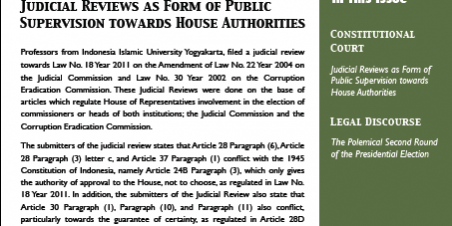Legal Discourse
The Polemical Second Round of the Presidential Election
The journey to Istana Merdeka becomes more and more interesting with each passing day. The frenzy between supporters regarding weaknesses and strengths of each presidential candidate through the media can’t seem to be paused. One issue raised is regarding the second round of the presidential election. There’s been a misinterpretation of Article 6A Paragraph 3 of the 1945 Constitution, which requires the candidates for President and Vice President who will be sworn to be ones who have at least 50% of the votes and at least 20% of votes in over half of the provinces in Indonesia. The question is; what if the 20% of votes from each province from over half the number of provinces in Indonesia is not met? Will there be a second round of voting even though the number of candidates stays the same?
Saldi Isra, constitutional law professor from University of Andalas, stated that since there are only two pairs of candidates, then the 20% requirement becomes irrelevant. In his opinion, the mandate of constitution makers regarding that requirement is only applied if there are more than two pairs of candidates. In order to validate that opinion, we need to refer to an authoritative document, namely the Comprehensive Paper of the 1999-2002 Constitution Amendments. Within it, there is a clear reflection of the line of debates between the constitution makers regarding how to restore the people’s sovereignty through direct elections. Therefore, the point is not in the number of candidates. The 50% requirement is to fulfill the national popular vote, while the 20% requirement in each province in over half of the number of provinces in Indonesia is an electoral vote, designed to open up electoral chances for candidates from outside of Java. It should be noted that at the time of the 1945 Constitution Amendments during 1999 to 2002 period of time; 60% of the voters were located in Java. With that particular fact, however candidates there might be, as long as the requirement mandated by the constitution isn’t fulfilled, re-elections must continue to take place.
There is no examination mechanism towards this misinterpretation, except through proposing an examination of the law towards the Constitution to the Constitutional Court. The law that should be examined is Article 159 of Law No. 42 Year 2008 on the Presidential and Vice Presidential Election, which contained the regulation that is similar with the constitution. If this is proposed, sure the Constitutional Court should have no problem in deciding, considering Hamdan Zoelva and Patrialis Akbar – both Constitutional Court Judges – were actively involved in the Constitution Amendments. However, which duo will be the one to propose this? If none of them do, the General Election Commission must take a firm stand as the organizer of the elections. They must issue a General Election Commission Regulation, whose material is merely a confirmation towards the norms in the constitution and the Law on the Presidential and Vice Presidential Election. Even if one of the parties objects after the election, the objection would be towards election results, no longer a constitutional examination of norms from the law towards the Constitution. (MSG)
Constitutional Court
Judicial Reviews as Form of Public Supervision towards House Authorities
Professors from Indonesia Islamic University Yogyakarta, filed a judicial review towards Law No. 18 Year 2011 on the Amendment of Law No. 22 Year 2004 on the Judicial Commission and Law No. 30 Year 2002 on the Corruption Eradication Commission. These Judicial Reviews were done on the base of articles which regulate House of Representatives involvement in the election of commissioners or heads of both institutions; the Judicial Commission and the Corruption Eradication Commission.
The submitters of the judicial review states that Article 28 Paragraph (6), Article 28 Paragraph (3) letter c, and Article 37 Paragraph (1) conflict with the 1945 Constitution of Indonesia, namely Article 24B Paragraph (3), which only gives the authority of approval to the House, not to choose, as regulated in Law No. 18 Year 2011. In addition, the submitters of the Judicial Review also state that Article 30 Paragraph (1), Paragraph (10), and Paragraph (11) also conflict, particularly towards the guarantee of certainty, as regulated in Article 28D Paragraph (1).
Judicial Reviews are a form of public supervision done by the people It is imperative to be done in order to guarantee that there is no abuse of power done, especially while carrying out legislative authorities or forming legislations. If the Constitutional Court grants the proposal, the House must accommodate, either by revising the Laws that are relevant or by revising the Internal Standing Orders of the House of Representatives. (FN)

